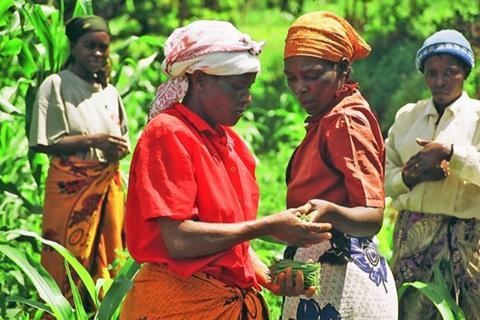
Consistency is the word that most frequently crops up when speaking about Kenya as a fresh produce supply country.
Its temperate climate and good infrastructure has seen it rise to become one of the most reliable year-round suppliers of peas and beans to the UK, not to mention its wider portfolio of fruit, legumes, butternut squash and Tenderstem.
But there are changes afoot. Kenya faces both growing global competition and a booming domestic market that is part of a wider urbanisation across Africa, while the Brexit vote may offer new opportunities for imports from outside the European Union.
Commercial director of Evesham-based importer Planet Produce, Pete Watson, explains: “Kenya has always been a major force in the supply of legumes to the UK and remains the most established source, particularly in terms of fine beans. However, competition has increased over recent years from countries such as Tanzania, Egypt and Morocco. For example, this year has seen the first experimental seafreight arrivals of fine beans from Guatemala, which could threaten Kenya’s supremacy on this product if trials prove successful.”
In the face of this competition, some Kenyan firms are looking at new areas of growth in the UK. “The rise of foodservice in the UK is an appealing sector,” says Ed Cunynghame, of Nairobi-based grower and exporter AAA Growers. “The retailers are very dominant in the UK, but the increased usage of restaurants, takeaways and box delivery schemes is certainly an area that needs to be serviced. Food will always have trends, and the UK’s appetite for healthy food is a powerful movement.”
Having begun life as a vegetable grower and diversifying into fruit, herbs and flowers, AAA Growers is now well-placed to target the UK’s caterers, having invested in a high-care facility that produces stir fry packs and medley ranges. The company currently only exports to two countries, says Cunynghame, who recently relocated to Kenya to help grow that side of the business. He says the firm has lots of enquiries from further afield and plans to exploit some of that interest to diversify its exports.
“Obviously there is still a lot to be agreed, but with potential changes to EU tariffs and the falling value of sterling, it could result in attempts to reduce costs by sourcing outside Europe. Spain and the Netherlands account for a large chunk of imports into the UK, so even if Kenya could take some of that market share, it would be a huge boost to the country’s economy,” he adds.
Another recent talking point in Kenyan supply has been pesticide residues on fine beans, with a spate of rejections leading to a change in legislation and testing. Some suppliers, such as exotics importer Jacana Produce, have looked at other regions for bean supply, but the company’s Mark Stuart says Kenya remains the best. “We’ve looked at other African regions such as Ethiopia and Tanzania for beans, and we find they can do short-term supply but have quality problems for anything longer,' he says. 'Their infrastructure isn’t up to scratch for our needs, they’re not geared up to deal with our specifications. Kenya has the best consistency.”
Logistics and transport costs are the other great challenge for both importers and exporters in the Kenya-UK trade, as the country competes with the east coast countries and their access to seafreight. Cunynghame adds: “There are certainly motivations to find non-airfreight product and hence looking at Spain and Morocco for more products, but Kenya has great systems and procedures in place to form a reliable supplier base.”
It’s clear the dynamics in African produce supply and exports are changing – perhaps permanently – but for now Kenya’s strong reputation in UK imports remains unshaken.
AfriAg opens doors with new UK subsidiary
With a recent report that said 38 per cent of retailers will source more from Africa post-Brexit, it’s no surprise that African suppliers are readying themselves for more direct access to the UK market.
One such company, AfriAg Global, recently opened a UK marketing arm, specifically to provide better access to British and European retailers for its growers and suppliers. AfriAg International, based in London under the leadership of Tim Stokes, will provide direct access to worldwide markets through experts who are “well versed in keeping costs and overheads at the lowest possible level”, a company statement reads.
With headquarters in Johannesburg, South Africa, AfriAg Global, and its marketing arm AfriAg Marketing, source from growers across sub-Saharan Africa for products including grapes, berries, stonefruit, apples, pears, squash, sweet potato, mangetout and sugar snaps.
The new division was designed to benefit growers by providing export assistance and marketing expertise, as well as the contacts and access to European retailers. The wider AfriAg group also provides a full logistics network from farmgate to client via AfriAg Pty, which runs a fleet of 58 refrigerated trucks and is one of the largest airfreight handlers in South Africa.
Toby Williams, of AfriAg Marketing, says southern Africa fills an important gap in the seasonal supply of many products, but admits the exchange rates and variable climate can mean returns to growers are unreliable. “The biggest challenge for the industry is providing the growers with sustainable price levels,” he explains. “Our low-cost structure will help to facilitate that, but I think clear, accurate, fast communication is equally important to growers and end customers alike. Representing growers directly in the destination market place, we can react quickly, be at the site for final delivery if required, and provide the accurate information required in order to progress and build together.”



